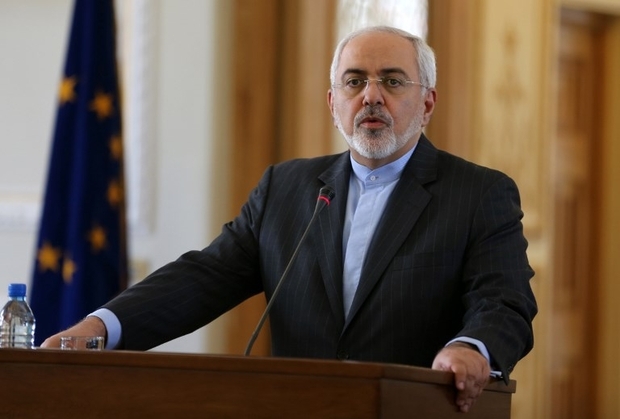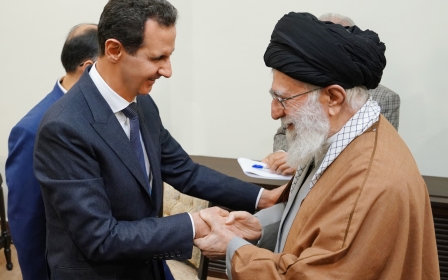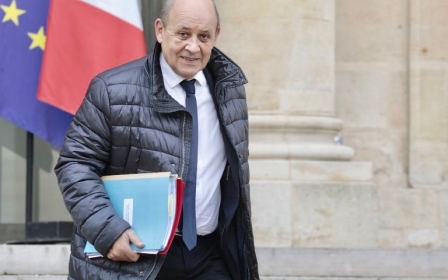Iran Foreign Minister Javad Zarif submits resignation

Iranian Foreign Minister Mohammad Javad Zarif has submitted his resignation, announcing the decision in a brief Instagram post.
"Many thanks for the generosity of the dear and brave people of Iran and its authorities over the past 67 months," he wrote on his Instagram page jzarif_ir, according to a Reuters translation.
He gave no specific reasons for his decision, but cited an "inability to continue serving".
"I sincerely apologise for the inability to continue serving and for all the shortcomings during my service. Be happy and worthy," his post read.
Zarif played an important role in striking a 2015 nuclear deal between Iran and six world powers.
New MEE newsletter: Jerusalem Dispatch
Sign up to get the latest insights and analysis on Israel-Palestine, alongside Turkey Unpacked and other MEE newsletters
But he came under attack by Iranian hardliners after the United States pulled out of the agreement last May and reimposed economic sanctions on some of the country's key industries.
Iran's semi-official Tasnim news agency said "some sources have confirmed Zarif's resignation" on Monday, but it was not clear whether President Hassan Rouhani would accept it, Reuters reported.
A spokesman for the Iranian mission to the United Nations, Alireza Miryousefi, confirmed that Zarif had submitted his resignation, the news agency said.
Two sources familiar with the matter also told NBC News that it remained unclear whether Zarif's resignation would be accepted.
US Secretary of State Mike Pompeo, in a post on Twitter, dismissed Zarif and Rouhani as "front men for a corrupt religious mafia".
"Our policy is unchanged - the regime must behave like a normal country and respect its people," Pompeo said.
'Striking and strange' resignation
Joe Macaron, a fellow at the Arab Center Washington DC, said announcing a resignation on Instagram is "unconventional and unprecedented" for an Iranian official.
"It seems... Zarif submitted his resignation letter and went on social media before either Rouhani and Khamenei [can] react to this resignation, which might mean that Zarif is locked in a fight with hardliners on what directions should the Iranian foreign policy take amidst growing US pressure on its economy," Macaron told MEE via email.
"We are yet to know the full story behind this resignation, but it seems to reflect heated debates in Tehran around the foreign policy challenges facing the Iranian regime."
Sina Toossi, research associate at the National Iranian American Council (NIAC), also noted the "striking and strange" nature of the announcement on Instagram.
He said the use of the popular, uncensored social media platform in Iran may have been a deliberate attempt for the news to reach the public directly.
"It could be a kind of calculated play where Zarif is submitting his resignation in a public way on Instagram... If Rouhani does not accept his resignation, if indeed he does not resign, he could come back empowered," Toossi told MEE.
"He offered his resignation; there was a huge outcry. He could come back stronger in his position."
'Should Zarif step down, however, it is unlikely that Iran's regional or nuclear policies will see significant shifts, as these are formulated through a consultative process involving not just the diplomatic corps but military and political inputs as well'
-Naysan Rafati, International Crisis Group
But if the foreign minister's resignation is accepted, Toossi said, it would be a major shift in the domestic balance of power away from the "moderate, pragmatic, reformist faction that Zarif embodies, especially on foreign policy".
Barbara Slavin, director of the Future of Iran Initiative at the Atlantic Council, echoed Toossi's comments on the Instagram announcement.
"A lot of Iranians are on Instagram, and of course his announcement was made in Farsi. If he wanted to reach Iranian public opinion, this was a very effective way to do it," Slavin told MEE.
She said Zarif's departure would be a sign that the nuclear deal may not survive.
"We had been hopeful that Iran would stick with it, at least throughout our election cycle, but it's pretty clear that Iranians aren't getting any of the benefit economically that they had hoped for," making it difficult for moderates like Zarif to defend remaining in the agreement, Slavin said.
However, Naysan Rafati, Iran analyst at the International Crisis Group, said the foreign minister's possible departure would not necessarily have a crucial impact on Iran's nuclear policies.
"As foreign minister, Zarif played a key role in negotiating the 2015 nuclear agreement, and his experience is not something they can easily replace," Rafati told MEE.
"Should Zarif step down, however, it is unlikely that Iran's regional or nuclear policies will see significant shifts, as these are formulated through a consultative process involving not just the diplomatic corps but military and political inputs as well."
A casualty of Trump's Iran policies?
Trita Parsi, a US-based Iran expert and author, told MEE it will be important to see how the Iranian public responds to Zarif’s resignation, since the news broke there late on Monday.
"It will be very interesting to see what those public reactions will be, mindful of the relatively strong domestic position he has [and] particularly mindful of the performance he had in Munich last week, which was very well received," Parsi said in a telephone interview.
In that speech in Germany, Zarif defended Iran against hostile rhetoric from members of the Trump administration and condemned Washington for pulling out of the 2015 nuclear deal.
"In spite of all the ignorant hate-speech by American officials, let me remind you that we Iranians are proud to be the inheritors of a great civilisation," Zarif said in the speech, a transcript of which was shared by Iran's foreign ministry.
"The entirety of humanity is today riding in the same boat and we either sail together; or sink together," he said.
'[Iranian hardliners'] attacks would not have become this potent and this problematic for [Zarif] had it not been for the fact that the Iranian public, by and large, are very disappointed in the JCPOA not living up to its promises'
- Trita Parsi, Iran analyst
According to Parsi, Zarif’s resignation may be seen as a casualty of Trump's decision to "sabotage" the 2015 nuclear deal, known as the JCPOA, under which Iran agreed to curb its nuclear programme in exchange for a lifting of international sanctions.
"The hardliners [in Iran] have obviously been attacking Zarif for a while. But their attacks would not have become this potent and this problematic for him had it not been for the fact that the Iranian public, by and large, are very disappointed in the JCPOA not living up to its promises,” Parsi said.
"That’s directly related to how Trump has sabotaged it."
Born in 1960, Zarif lived in the US from the age of 17 as a student in San Francisco and Denver, and subsequently as a diplomat to the UN in New York, where he served as Iran's ambassador from 2002 to 2007.
He was appointed minister of foreign affairs in August 2013 after Rouhani won the presidency in a landslide, on a promise to open up Iran to the outside world.
Since taking charge of Iran's nuclear talks with major powers in late 2013, Zarif has been summoned to parliament several times by hardline lawmakers to explain the negotiations.
Some hardliners even threatened Zarif with bodily harm after the nuclear deal was signed.
Middle East Eye delivers independent and unrivalled coverage and analysis of the Middle East, North Africa and beyond. To learn more about republishing this content and the associated fees, please fill out this form. More about MEE can be found here.




